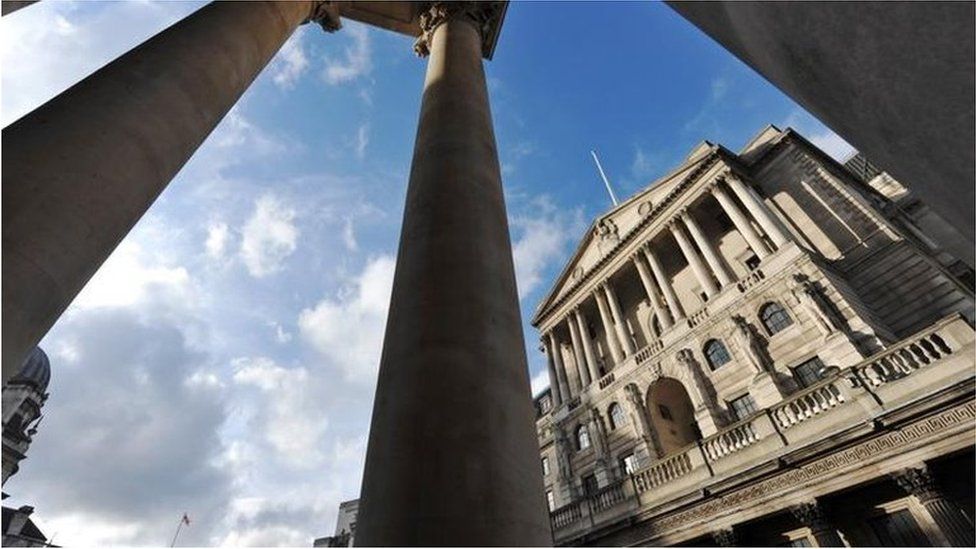Bank surprises with interest rate vote
- Published

UK interest rates have been kept on hold at 0.25%, but in a surprise move three of the Bank of England's rate-setting committee backed a rate rise.
The 5-3 vote by the Bank's policymakers was the closest for a rate rise since 2007, and comes with inflation close to a four-year high of 2.9%.
Inflation is now well above the Bank's target rate of 2%.
News of the vote pushed the pound up by more than a cent against the dollar, although it fell back later.
Ian McCafferty, Michael Saunders and Kristin Forbes were the three members of the Monetary Policy Committee (MPC) who voted for an increase. Ms Forbes had been the sole vote in favour of a rise at the MPC's previous two meetings.
However, the decision of Mr Saunders and Mr McCafferty to back an increase as well surprised economists.
"The more hawkish tone of the MPC appears to reflect some concern about inflation - which has accelerated faster than it expected over recent months and is now forecast to exceed 3% this year - as well as the strength of employment that is continuing to erode slack in the labour market," Capital Economics said.
Hargreaves Lansdown senior economist Ben Brettell said it appeared that the "willingness of the MPC to 'look through' higher inflation and leave rates on hold is wearing thin, and if inflation continues to surprise we could see higher rates by the end of the summer".
Sterling, which had been trading below $1.27 before the minutes were released, surged to almost $1.28 in response, while the FTSE 100 share index was down more than 1%.
Inflationary pressure
In the minutes of its meeting, the MPC said the "driving force" behind the recent pickup in inflation had remained the depreciation of sterling that followed the Brexit vote in June last year.
However, it added that a "number of indicators of domestically generated inflationary pressure" had also increased in recent months.
The committee said inflation could exceed 3% by the autumn and was expected to remain above the 2% target for an "extended period" as the weaker pound pushed up prices while pay growth remained "subdued".
The three MPC members who voted to raise rates were swayed by the inflation fears, and also took into account growth in "business investment and net trade" which appear "on track" to compensate for weaker consumption. They also thought that interest rates would still leave monetary policy "very supportive".
However, the five committee members who voted to leave rates unchanged took into account the recent slowdown in consumer spending and economic growth as a whole. They said "it was too early to judge with confidence how large and persistent", that would be.
"It is as yet unclear to what degree weaker consumption would be offset by other components of demand". the minutes said.
Changing views
While different members of the MPC placed different weights on these arguments, the minutes said that "all committee members agreed that any increases in Bank Rate would be expected to be at a gradual pace and to a limited extent".
Kallum Pickering, senior UK economist at Berenberg, said: "This gradual shift in stance represents the MPC's efforts to foretell and communicate a forthcoming hike. Don't ignore it."
However, other economists said it could still be some time before the Bank votes to rise rates.
"It is far from certain that interest rates will rise in the near term," said Howard Archer, chief economic adviser to the EY Item Club.
"There is the potential for the balance of views to alter, with the imminent changes in the MPC's membership. Kristin Forbes who has been a strong advocate of raising interest rates is now leaving the MPC, while another member is due to appointed as the committee is currently one short."
- Published15 June 2017
- Published14 June 2017
- Published13 June 2017
- Published14 June 2017